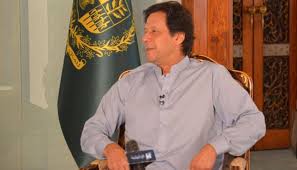Pak won’t tolerate any threat to Saudi Arabia, Riyadh assured

Islamabad committed to Saudi Arabia’s territorial integrity Pak against any threat to Harmain Shareefain sanctity Houthis’ attack on Abha city condemned Pakistan has assured Saudi Arabia that it will not tolerate any threat to the Kingdom’s territorial integrity, officials said. Senior officials at the foreign ministry told The Nation that high-level contacts were made with Riyadh after a drone attack by Yemen’s Houthis on Saudi Arabia’s Abha city. “We have reassured Saudi Arabia that Pakistan stands with them and will not remain silent on any attack on the friendly country,” said one official, citing top-level contacts. He added: “There was no demand from Saudi Arabia (for now) to send any troops for any possible war (with the Houthis).” Another official said Pakistan wanted to settle the Yemen issue peacefully through talks. “This has been conveyed to all the parties but we have also been very clear that we will not allow anybody to attack Saudi Arabia. Our commitment to Harmain Shareefain (the two holy mosques) is beyond any doubt,” he maintained. Earlier, Pakistan ‘noted with serious concern’ the drone attack by Yemen’s Houthis on Saudi Arabia’s Abha city. A statement issued by Foreign Office in Islamabad, said Pakistan “reiterates its full support and solidarity with government and people of Saudi Arabia against any threats to the kingdom’s territorial integrity and Harmain Shareefain.” It said such attacks, targeting unarmed civilian population, were a clear violation of international law and pose a serious challenge to regional peace and security. The statement said: “We condemn them in the strongest terms and stand in solidarity with Saudi government in fighting terrorism in all its forms and manifestations.” It said Pakistan commended the government of Saudi Arabia, especially the Royal Defence Forces, for timely intercepting and destroying the drone before it could cause any serious damage. The Foreign Office said the news of injuries to Saudis and other expatriates, as well as damage to properties, as a result of falling debris of this drone remains a matter of concern and “we pray for early recovery of the injured.” Recently, Foreign Minister Shah Mehmood Qureshi had said Saudi Arabia was not throwing Pakistan into the Yemen conflict in return for huge investments in the cash-starved country. “We are not being tossed into the Yemen conflict. The extraordinary investments (by Saudi Arabia) are totally bilateral. They are also not linked to the CPEC (China-Pakistan Economic Corridor),” he had said. Asked if there was pressure on Prime Minister Imran Khan as he postponed his visit to Iran ahead of Saudi Crown Prince Mohammed bin Salman’s visit, Qureshi said: “We have regular interaction with Iran and in the recent past we had three major meetings.” He said even Iran had shown no reservations against Pak-Saudi Arabia ties. “They (Iran) have given a statement which approves our bilateral ties (with Saudi Arabia),” he added. Qureshi said former army chief Raheel Sharif, who heads the 41-member Saudi-led military alliance, had made it clear before Prince Mohammad bin Salman’s visit in February that the coalition was not formed against any particular sect, region or country. Pakistan had in the past declined to join the Saudi-led coalition waging war on Iran-aligned rebels in Yemen. The Saudi Crown Prince had visited in Pakistan last month. During his two-day stay, Pakistan and Saudi Arabia signed a number of agreements and Memorandums of Understanding related to diverse sectors, including investment, finance, power, renewable energy, internal security, media, culture and sports. The two countries also discussed ways and means to develop a robust follow-up mechanism to ensure effective implementation and quick progress on tangible areas of cooperation. Saudi Arabia is likely to set up an oil refinery in Pakistan, whereas it would also invest in minerals resources. The kingdom has promised to provide oil worth $ 3 billion to Pakistan for three years in addition to its previous transfer of $ 3 billion cash in Pakistan’s account to help ease the economic crises. Pakistan has also told Iran that its closeness to Saudi Arabia was not against Tehran. Islamabad had contacted Tehran ahead of Saudi Arabian Crown Prince Mohammed bin Salman’s visit to Islamabad and assured them about their policy of non-interference. Iran – which supported Houthis – was assured that Pakistan cannot be used against Iran nor Saudi Arabia had made any demand. In 2016, Pakistan was active to ease Iran-Saudi Arabia tensions after Saudi Arabia executed 47 people on terrorism charges including Nimr al-Nimr, a Shia religious leader, and Fares Al-Shuwail Al-Zahrani, a convicted Al-Qaeda leader. Then Prime Minister Nawaz Sharif remained in contact with the top Iran and Saudi leadership to defuse the tension. He had held talks with Saudi King Salman Bin Abdul Aziz and President Rouhani convincing them to resolve the disputes on the table. Pakistan and Iran are also hoping to complete the Iran-Pakistan gas pipeline project soon to resolve Pakistan’s energy crisis. IP pipeline project – also called Peace Pipeline – is aimed at constructing pipeline from Iran’s South Pars fields in the Persian Gulf to Pakistan’s major cities of Karachi and Multan. Iran was concerned when former army chief Raheel Sharif was appointed as head of the Saudi-led alliance. Riyadh had desired to appoint Raheel Sharif as head of the military alliance even prior to his retirement in November 2016. Over the weekend, Prime Minister Imran Khan held a telephonic conversation with the Iranian President Hassan Rouhani as part of his contacts to brief important regional countries and their leadership about the regional situation. “Both leaders reiterated the importance of strengthening bilateral relations. Both leaders agreed on the need for closer cooperation among the two intelligence agencies in combating terrorism,” said an official statement. President Rouhani said that Pakistan and Iran were “neighbours and brotherly countries linked through centuries of closed historic cultural and people to people linkages and their role would remain central in promoting peace, stability and economic development in the region.”





